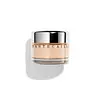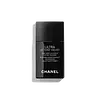What's inside
What's inside
 Key Ingredients
Key Ingredients

 Benefits
Benefits

 Concerns
Concerns

 Ingredients Side-by-side
Ingredients Side-by-side

Water
Skin ConditioningCyclopentasiloxane
EmollientTitanium Dioxide
Cosmetic ColorantCetyl PEG/PPG-10/1 Dimethicone
EmulsifyingPentylene Glycol
Skin ConditioningDimethicone
EmollientButylene Glycol
HumectantTalc
AbrasivePEG-400
Emulsion StabilisingSodium Chloride
MaskingSilica Dimethyl Silylate
EmollientPhenoxyethanol
PreservativeGlycerin
HumectantAluminum Hydroxide
EmollientMica
Cosmetic ColorantDimethicone/Vinyl Dimethicone Crosspolymer
Skin ConditioningChlorphenesin
AntimicrobialStearic Acid
CleansingAlcohol
AntimicrobialLaminaria Saccharina Extract
Skin ProtectingCamellia Sinensis Leaf Extract
AntimicrobialRosmarinus Officinalis Leaf Extract
AntimicrobialOryza Sativa Bran Extract
Skin ConditioningArnica Montana Flower Extract
MaskingChamomilla Recutita Flower Extract
MaskingAloe Barbadensis Leaf Extract
EmollientNatto Gum
Iron Oxides
Water, Cyclopentasiloxane, Titanium Dioxide, Cetyl PEG/PPG-10/1 Dimethicone, Pentylene Glycol, Dimethicone, Butylene Glycol, Talc, PEG-400, Sodium Chloride, Silica Dimethyl Silylate, Phenoxyethanol, Glycerin, Aluminum Hydroxide, Mica, Dimethicone/Vinyl Dimethicone Crosspolymer, Chlorphenesin, Stearic Acid, Alcohol, Laminaria Saccharina Extract, Camellia Sinensis Leaf Extract, Rosmarinus Officinalis Leaf Extract, Oryza Sativa Bran Extract, Arnica Montana Flower Extract, Chamomilla Recutita Flower Extract, Aloe Barbadensis Leaf Extract, Natto Gum, Iron Oxides
Water
Skin ConditioningIsododecane
EmollientHydrogenated Polyisobutene
EmollientDimethicone
EmollientDicaprylyl Carbonate
EmollientAlcohol
AntimicrobialCellulose
AbsorbentVinyl Dimethicone/Methicone Silsesquioxane Crosspolymer
Synthetic Fluorphlogopite
PEG-9 Polydimethylsiloxyethyl Dimethicone
EmulsifyingIsodecyl Neopentanoate
EmollientPropylene Glycol Dicaprylate
EmollientStearalkonium Hectorite
Gel FormingSodium Chloride
MaskingMaltodextrin
AbsorbentDimethicone/Bis-Isobutyl PPG-20 Crosspolymer
EmollientPotassium Sorbate
PreservativePropylene Carbonate
SolventParfum
MaskingAluminum Hydroxide
EmollientTocopherol
AntioxidantSodium Lauroyl Glutamate
Biosaccharide Gum-1
HumectantLysine
Skin ConditioningMagnesium Chloride
CI 77007
Cosmetic ColorantCI 77491
Cosmetic ColorantCI 77492
Cosmetic ColorantCI 77499
Cosmetic ColorantCI 77891
Cosmetic ColorantMica
Cosmetic ColorantWater, Isododecane, Hydrogenated Polyisobutene, Dimethicone, Dicaprylyl Carbonate, Alcohol, Cellulose, Vinyl Dimethicone/Methicone Silsesquioxane Crosspolymer, Synthetic Fluorphlogopite, PEG-9 Polydimethylsiloxyethyl Dimethicone, Isodecyl Neopentanoate, Propylene Glycol Dicaprylate, Stearalkonium Hectorite, Sodium Chloride, Maltodextrin, Dimethicone/Bis-Isobutyl PPG-20 Crosspolymer, Potassium Sorbate, Propylene Carbonate, Parfum, Aluminum Hydroxide, Tocopherol, Sodium Lauroyl Glutamate, Biosaccharide Gum-1, Lysine, Magnesium Chloride, CI 77007, CI 77491, CI 77492, CI 77499, CI 77891, Mica
 Reviews
Reviews

Ingredients Explained
These ingredients are found in both products.
Ingredients higher up in an ingredient list are typically present in a larger amount.
Alcohol comes in many different forms. Different types of alcohol will have different effects on skin. This ingredient is usually an astringent alcohol.
These alcohols are drying on the skin. They may strip away your skin's natural oils and even damage your skin barrier. Astringent alcohols may also irritate skin.
Other types of astringent alcohols include:
According to the National Rosacea Society based in the US, you should be mindful of products with these alcohols in the top half of ingredients.
Any type of sanitizing product will have high amounts of alcohol to help kill bacteria and viruses.
Fatty alcohols come from plant oils such as coconut oil. These can help hydrate the skin and are non-irritating. Some fatty alcohols include cetyl and stearyl alcohol.
Learn more about AlcoholAluminum Hydroxide is a form of aluminum. It can be naturally found in nature as the mineral gibbsite. In cosmetics, Aluminum Hydroxide is used as a colorant, pH adjuster, and absorbent.
As a colorant, Aluminum Hydroxide may add opacity, or reduce the transparency. Aluminum hydroxide is contains both basic and acidic properties.
According to manufacturers, this ingredient is an emollient and humectant. This means it helps hydrate the skin.
In medicine, this ingredient is used to help relieve heartburn and help heal ulcers.
There is currently no credible scientific evidence linking aluminum hydroxide in cosmetics to increased cancer risk.
Major health organizations allow the use of aluminum hydroxide in personal care products and have not flagged it as a carcinogenic risk at typical usage levels.
Learn more about Aluminum HydroxideDimethicone is a type of synthetic silicone created from natural materials such as quartz.
What it does:
Dimethicone comes in different viscosities:
Depending on the viscosity, dimethicone has different properties.
Ingredients lists don't always show which type is used, so we recommend reaching out to the brand if you have questions about the viscosity.
This ingredient is unlikely to cause irritation because it does not get absorbed into skin. However, people with silicone allergies should be careful about using this ingredient.
Note: Dimethicone may contribute to pilling. This is because it is not oil or water soluble, so pilling may occur when layered with products. When mixed with heavy oils in a formula, the outcome is also quite greasy.
Learn more about DimethiconeMica is a naturally occurring mineral used to add shimmer and color in cosmetics. It can also help improve the texture of a product or give it an opaque, white/silver color.
Serecite is the name for very fine but ragged grains of mica.
This ingredient is often coated with metal oxides like titanium dioxide. Trace amounts of heavy metals may be found in mica, but these metals are not harmful in our personal products.
Mica has been used since prehistoric times throughout the world. Ancient Egyptian, Indian, Greek, Roman, Aztec, and Chinese civilizations have used mica.
Learn more about MicaChances are, you eat sodium chloride every day. Sodium Chloride is also known as table salt.
This ingredient has many purposes in skincare: thickener, emulsifier, and exfoliator.
You'll most likely find this ingredient in cleansers where it is used to create a gel-like texture. As an emulsifier, it also prevents ingredients from separating.
There is much debate on whether this ingredient is comedogenic. The short answer - comedogenic ratings don't tell the whole story. Learn more about comegodenic ratings here.
The concensus about this ingredient causing acne seems to be divided. Research is needed to understand if this ingredient does cause acne.
Scrubs may use salt as the primary exfoliating ingredient.
Learn more about Sodium ChlorideWater. It's the most common cosmetic ingredient of all. You'll usually see it at the top of ingredient lists, meaning that it makes up the largest part of the product.
So why is it so popular? Water most often acts as a solvent - this means that it helps dissolve other ingredients into the formulation.
You'll also recognize water as that liquid we all need to stay alive. If you see this, drink a glass of water. Stay hydrated!
Learn more about Water